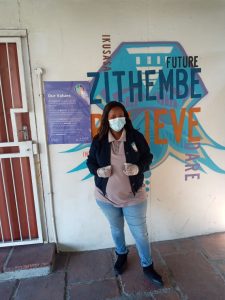How Mentor Mothers Make the Difference in Africa’s COVID-19 Hotspot
The Cape Town Metropolitan area, where mothers2mothers (m2m) is headquartered, is the epicentre of the COVID-19 pandemic in Africa. This week, m2m President and CEO Frank Beadle de Palomo looks at the challenges that crowded and impoverished townships, like Khayelitsha in Cape Town, South Africa, face in stopping the spread of the virus and how the brave women we employ as Mentor Mothers are working tirelessly on the frontlines in these urban settings to help women and families stay safe and healthy.
 “A pregnant client told me she had not gone to the clinic for her regular check-up because she was scared of COVID-19. Other clients are not coming in to pick up their HIV medication for the same reason. I call them and explain why it is important to stay in care and on treatment, and support them to get the health services they need.”— Nolundi Pani, a Mentor Mother who runs m2m services for adolescent girls and young women at the Khayelitsha Community Health Centre in Khayelitsha, the largest township in Cape Town, South Africa.
“A pregnant client told me she had not gone to the clinic for her regular check-up because she was scared of COVID-19. Other clients are not coming in to pick up their HIV medication for the same reason. I call them and explain why it is important to stay in care and on treatment, and support them to get the health services they need.”— Nolundi Pani, a Mentor Mother who runs m2m services for adolescent girls and young women at the Khayelitsha Community Health Centre in Khayelitsha, the largest township in Cape Town, South Africa.
Cape Town—and Khayelitsha, in particular—is the epicentre for COVID-19 in Africa. At the time of writing, with almost 30,000 cases to date, the Cape Town Metropolitan area has over half of all cases in South Africa and 13 percent of cases in Africa as a whole.
Fear and confusion
Fear and confusion have permeated Khayelitsha for the last ten weeks after South Africa imposed a strict lockdown. Information on what health services are available and how to access them constantly changes, discouraging some of our clients from accessing health services and picking up medication. Other clients travelled to their home villages outside Cape Town before the lockdown, thinking it would not last long, and are now unable to return to Khayelitsha to pick up treatment refills. This toxic mix of confusion, fear, and challenges around accessing health services is of great concern—not just in terms of facing down COVID-19, but also because COVID-19 poses serious health consequences for people living with HIV who are not on treatment.
It is easy to understand why Khayelitsha is so vulnerable to rapid community spread of COVID-19. Social distancing in a poor urban environment, like Khayelitsha, is nearly impossible. Often, multiple family members live in small one room dwellings. Many people do not have access to running water, and instead rely on a community tap and share common toilets, where COVID-19 and other germs can spread easily. COVID-19 cases are not just rising among residents, but among medical staff too—putting a serious strain on the township’s already understaffed and under-resourced health system.
Bolstering the frontlines
Nolundi and her fellow Mentor Mothers have been designated as essential workers by the government and work tirelessly on the frontlines. They suit up in personal protective equipment (PPE) to meet adolescents and young women one-on-one at a safe distance, and spend hours every day calling clients who have not made it into the health centre, including those who are out of town—helping them navigate access to the health services they need.
“It is essential for Mentor Mothers to continue to provide our normal services, including educating adolescents and young women about HIV and reproductive health. This population is so vulnerable and their health needs have not gone away with COVID-19,” Nolundi says.
Challenges ahead
On Monday, 1 June, South Africa eased its nationwide lockdown, allowing more businesses to open and activities to resume. While this is important to relieve widespread unemployment and hunger, it may put vulnerable communities like Khayelitsha at even greater risk. According to modelling used by the government, the number of COVID-19 cases in South Africa could reach 1.2 million, intensive care units could be overwhelmed within weeks, and the number of deaths could reach 40,000 by November.
No matter how challenging the situation becomes, Mentor Mothers will be standing strong on the frontlines, helping women and families stay safe and healthy. In fact, in July, Nolundi and her team will launch m2m’s first non-communicable disease services, screening clients of all ages for diabetes and hypertension—which can cause life-threatening complications from COVID-19—educating them on lifestyle risk factors and nutrition, helping ensure adherence to treatment (as we already do for HIV), and making referrals to specialised services, if needed.
“I am doing what I love. I’d rather be in the health centre than anywhere else, making a difference for people in my community. That is where my heart is,” Nolundi says.
Please support Mentor Mothers, like Nolundi, to provide lifesaving services at this unprecedented time by clicking here.






















